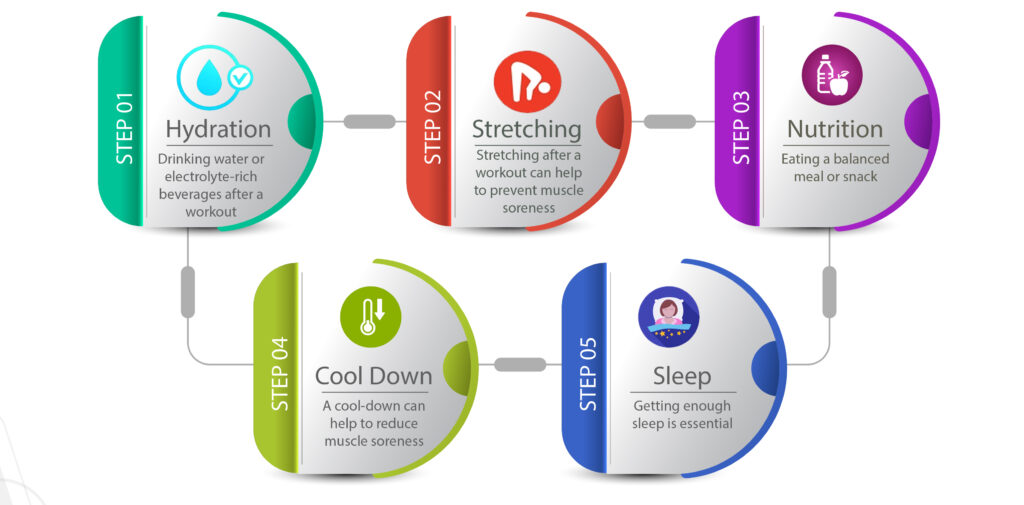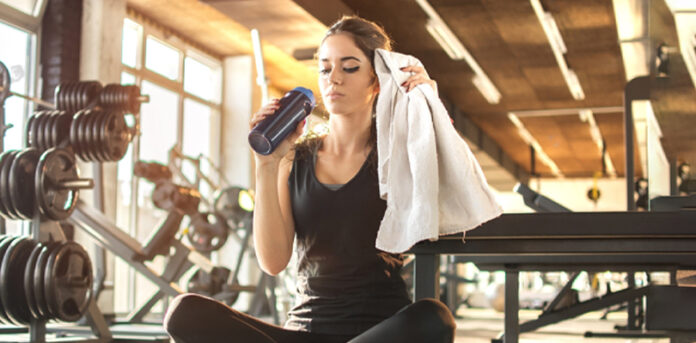Workouts are great for our physical and mental health, but it’s important to remember that the work doesn’t stop when the workout is over. In fact, the things you do after a workout can be just as important as the workout itself. Here are 5 amazing things you must do after your next workout to help improve your results and overall well-being:
After a workout, it’s important to take care of your body to ensure that you’re getting the most out of your workout routine. This includes hydrating with water or electrolyte-rich drinks, stretching to prevent muscle soreness and improve flexibility, and fueling your body with nutrient-dense foods to aid in recovery and muscle growth. By incorporating these tips into your post-workout routine, you can ensure that you’re feeling your best and getting the most out of your workouts. Here in this blog, we will talk about things to do after a workout, foods best for eating after a workout, and more.
Thing To Do After Workouts

Hydration
Drinking water or electrolyte-rich beverages after a workout is crucial for replenishing fluids lost through sweating and helping to prevent dehydration. It’s also important for maintaining the proper function of the muscles, joints, and organs. Try to drink at least 16-20 oz. of water within 30 minutes of finishing your workout. Proper hydration after a workout can help to replenish fluids lost through sweating, prevent dehydration and support the proper function of the muscles, joints, and organs. It can also help to reduce muscle soreness and fatigue and improve overall performance.
Stretching
Stretching after a workout can help to prevent muscle soreness and improve flexibility. It’s important to hold each stretch for at least 15-30 seconds and to focus on stretching the muscles that were used during your workout. Static stretching, where you hold a stretch for a period of time, is best done after a workout. This can lead to a better range of motion, improved posture, and reduced risk of injury. Additionally, stretching can also improve blood flow to the muscles, helping to speed up recovery time.
Nutrition
Eating a balanced meal or snack that contains a mix of carbohydrates, protein, and healthy fats after a workout can help to refuel and repair your muscles. Carbohydrates help to replenish glycogen stores, protein helps to rebuild and repair muscle tissue and healthy fats provide energy and support overall health. This can also lead to muscle growth, weight loss, and improved overall health.
Cool Down
A cool-down can help to reduce muscle soreness and stiffness by gradually slowing down your heart rate. This can be done by walking or jogging for a few minutes, or by doing some light stretching. Additionally, using a foam roller on the muscles you worked out can help to release tension and improve blood flow. This can also improve your recovery time, reduce muscle soreness and improve your muscle flexibility.
Sleep
Getting enough sleep is essential for the body to repair and recover after workouts. Aim for 7-9 hours of sleep per night, and try to maintain a consistent sleep schedule to ensure that your body is well-rested and ready for the next day’s workout. Adequate sleep can improve muscle recovery, boost your immune system and help you maintain a healthy weight. This can also improve your overall energy, memory, and mood during the day. Additionally, adequate sleep is crucial for muscle growth and repair.
Things Happening To A Body After Workouts
After an intense workout, several changes take place in the body, including:
- Muscle Damage: During intense exercise, small tears can occur in muscle fibers. These tears cause inflammation, which leads to muscle soreness, also known as Delayed Onset Muscle Soreness (DOMS).
- Increased blood flow: During a workout, blood flow increases to the muscles, delivering oxygen and nutrients to aid in recovery and repair.
- Cardiovascular changes: An intense workout causes an increase in heart rate and blood pressure, which can lead to an increase in cardiovascular fitness over time.
- Hormonal changes: Intense exercise triggers the release of hormones such as adrenaline and endorphins, which can improve mood and reduce stress.
- Metabolic changes: Intense exercise can cause an increase in metabolism, which can lead to an increase in calorie burn and a reduction in body fat.
- Glycogen depletion: Intense exercise can lead to the depletion of glycogen stores in the muscles, which are the primary energy source during intense exercise.
- Increased muscle protein synthesis: Intense exercise can lead to an increase in muscle protein synthesis, which is the process by which the body repairs and rebuilds muscle tissue.
- Immune system changes: Intense workouts can temporarily suppress the immune system, making you more susceptible to infection.
It’s important to note that these changes are temporary, and with proper recovery and nutrition, the body will repair and adapt to the stress of intense exercise over time.
Tips And Ideas About What To Do After Workout
- Relax and unwind: Take some time to relax and unwind after a workout. This could include reading a book, listening to music, meditating, or taking a warm bath.
- Listen to your body: Pay attention to how your body feels after a workout and adjust your post-workout routine accordingly. If you’re feeling sore or tired, take it easy and focus on recovery.
- Keep a workout journal: Keep track of your workouts and how you felt after each one. This can help you identify patterns and make adjustments to your routine as needed.
- Try Active recovery: Incorporate active recoveries like yoga, swimming, cycling, or light cardio after a workout to help with muscle recovery, increase blood flow and reduce muscle soreness.
- Reward yourself: Treat yourself to a job well done after workouts. This could include a healthy snack, a massage, or even a new workout outfit.
- Consuming alcohol: Consuming alcohol after workouts can dehydrate the body, slow down muscle recovery and interfere with sleep.
- Taking a hot shower immediately: Taking a hot shower immediately after a workout can cause blood vessels to dilate, leading to increased blood flow to the skin, which can impede recovery time
- Smoking: Smoking after a workout can decrease blood flow and oxygen delivery to the muscles, which can slow down muscle recovery.
- Sitting for too long: Sitting for long periods of time after a workout can cause blood to pool in the legs, slowing down muscle recovery and increasing the risk of blood clots.
Healthy Foods To Eat After Workouts
- Greek yogurt with berries: Greek yogurt is a great source of protein to help repair and rebuild muscle tissue, while berries provide carbohydrates for energy.
- Whole grain bread with turkey and avocado: Whole grains provide carbohydrates for energy, turkey is a good source of protein, and avocado is a healthy fat that can help reduce inflammation.
- Salmon with sweet potatoes: Salmon is a great source of omega-3 fatty acids and protein, and sweet potatoes provide carbohydrates for energy.
- Protein shake with fruits and veggies: A protein shake made with a scoop of protein powder, fruits, and veggies is an easy and convenient way to get the nutrients your body needs after workouts.
- Grilled chicken with roasted vegetables: Grilled chicken provides protein, while roasted vegetables provide carbohydrates, antioxidants, and other essential nutrients.
- Tuna salad on whole grain bread: Tuna is a great source of lean protein, while whole grain bread provides carbohydrates for energy.
- Smoothie with protein powder, Greek yogurt, and berries: A smoothie with protein powder, Greek yogurt, and berries is a great way to get a balance of carbohydrates, protein, and healthy fats after a workout.
- Brown rice with lentils and vegetables: Brown rice provides carbohydrates for energy, lentils are a good source of protein and fiber, and vegetables provide essential vitamins and minerals.
How To Recover Muscle Soreness After A Workout
- Rest: Get plenty of rest and sleep to allow your body to repair and recover.
- Ice: Applying ice to sore muscles can help to reduce inflammation and pain in muscles used in workouts.
- Heat: Applying heat to sore muscles can also help to increase blood flow and reduce muscle soreness.
- Massage: A gentle massage can help to release tension in sore muscles and improve blood flow.
- Active Recovery: Incorporate light activity or low-impact exercises that are easy on the sore muscles, such as swimming, yoga, or cycling.
- Take an Anti-inflammatory: Taking an over-the-counter anti-inflammatory medication like ibuprofen can help reduce muscle soreness and inflammation.
- Listen to your body: Pay attention to how your body feels and take it easy if you’re feeling sore or fatigued.
It’s important to note that muscle soreness is a normal part of the recovery process, and typically subsides within a few days. However, if muscle soreness persists or becomes severe, it’s best to consult with a healthcare professional.
FAQs
How soon should I hydrate after a workout?
It’s best to drink water or an electrolyte-rich beverage within 30 minutes of finishing your workout to replenish fluids lost through sweating and help prevent dehydration.
How long should I hold a stretch?
It’s best to hold each stretch for at least 15-30 seconds, focusing on the muscles that were used during your workouts.
How soon after a workout should I eat?
It’s best to eat a balanced meal or snack that contains a mix of carbohydrates, protein, and healthy fats within 30 minutes of finishing your workout to refuel and repair your muscles.
How long should my cool-down be?
A cool-down should be brief, taking only a few minutes. This can be done by walking or jogging for a few minutes, or by doing some light stretching.

